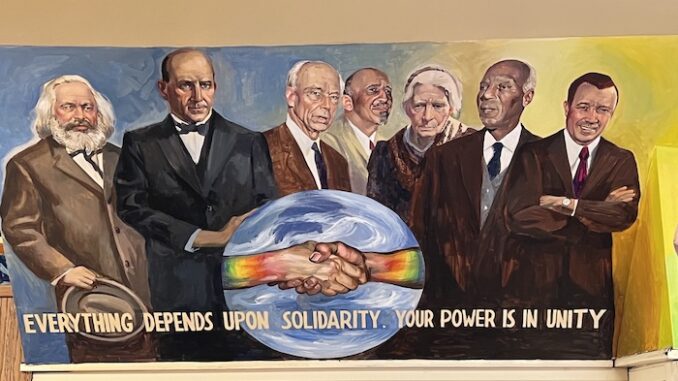
It is important to realize that most of our civil rights were hard won by years of struggle. Two
recent experiences reminded us how difficult and personal that fight can be. Labor rights, like the 40 hour work week, taken for granted today, were once uncommon, and achieved only through a long and violent struggle that is mostly forgotten in modern history.
That is why the recent re-release of the landmark, first-person, labor movement documentary “The Wobblies” and a visit to the Eugene V. Debs Museum were so moving.
Debs, originally a Democrat and independent labor organizer at the turn of the century, later
become one of the leading figures of the socialist movement in America and was revered
enough to receive over one million votes while running as a socialist for President.

Debs lived his entire adult life in a home in Terre Haute Indiana, at the time a center of the
railroad industry, and began his organizing efforts by trying to create modest protections for
workers injured while working in rail yards. The Debs home in Terre Haute became a museum
several decades ago, and is dedicated to preserving the history of labor struggles and other
socialist reforms achieved during Debs’ lifetime.
For example, workers were often mistreated, from verbal humiliation and even beatings were
common. When workers attempted to organize collective bargaining unions, armed private
security forces were employed to physically intimidate and injure them.
While anti-union movements today still employ extreme tactics to dissuade unionization efforts, instead of armed security, highly paid consultants are the weapon of choice. Workers are told that unionization will reduce their rights, some workers advocating unions have been subject to surveillance, and companies have had mandatory meetings undermining union talking points.
While Debs is not explicitly mentioned in “The Wobblies”, the socialist movement he popularized is certainly at its center. The film presents excerpts of first-person interviews with workers who were present at many of the most violent strikes and protests. While this approach is a bit jarring and confusing at first, as each person tells their story, themes emerge that illustrate why the movement was necessary. This narrative structure without editorial commentary allows the viewer to draw their own conclusions, and in fact mimics the self-organizing approach of the socialist labor movement.

What makes this 1979 documentary so intriguing is not how much things have changed, but
how much they have remained the same. The stories of dedication and personal risk told in this film, sound hauntingly similar to those attempting to gain greater rights today. The narrators are not professional organizers, worker organizers, as they depict an era before mass unionization.
Recent successful unionization efforts have similarly been ground up rather than top down
efforts, after a long period of decline which has reduced union membership.

The film depicts another important aspect of the movement, how the “folk” element was weaved into organizing efforts. Songs were an important part of organizing efforts, with songwriters such as Joe Hill helping to popularize the movement with songs that became worker anthems.
Debs himself insisted that no worker of any type be refused membership, resulting in the
Wobblies (the nickname for the IWW, Industrial Workers of the World) having a multi-racial
inclusiveness that was shocking in its day. Women played a large role in the IWW, and are well represented in the documentary.

The most heart-warming element of this film is the personal aspect of the stories told. Each of the persons interviewed can depict concrete changes in their quality of life as a result of their organizing efforts. Many of the rights these workers fought for are taken for granted today, such as a set 8 hour workday, receiving the minimum wage and being paid overtime, and protections from injuries on the job.
This film and the Eugene Debs Museum inspire a deep respect for the gains made at great
personal risk by the organizers in the early 20th century, and for the dedication of those
organizers working against all odds today.
The Wobblies
Access the documentary at the Kino Marquee Website
Eugene V. Debs Museum
The museum is currently open for regular hours.
Tuesday––Saturday
12:00––5:00 PM Eastern Time
Daily Tours at 1:00 and 3:00 PM
Walk-Ins Always Welcome
Daily Tours at 1:00 and 3:00 PM
Walk-Ins Always Welcome
Eugene V. Debs Museum
Website
Hours:
Tuesday––Saturday 12:00––5:00 PM Eastern Time
Daily Tours at 1:00 and 3:00 PM
Walk-Ins Always Welcome
Morning and evening tours are available by appointment. Schedule an after-hours visit by
emailing mu****@de************.org or calling 812-232-2163.
Location:
451 N 8th St
Terre Haute, IN. 47807
Photos are courtesy of Steve Pasek and “The Wobblies”

Be the first to comment